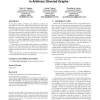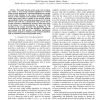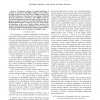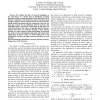126
Voted
PODC
2012
ACM
13 years 4 months ago
2012
ACM
This paper proves a necessary and sufficient condition for the existence of iterative algorithms that achieve approximate Byzantine consensus in arbitrary directed graphs, where e...
141
click to vote
DCOSS
2011
Springer
14 years 1 months ago
2011
Springer
—In many application scenarios sensors need to calculate the average of some local values, e.g. of local measurements. A possible solution is to rely on consensus algorithms. In ...
165
click to vote
TSP
2010
14 years 8 months ago
2010
Abstract-- This paper presents greedy gossip with eavesdropping (GGE), a new average consensus algorithm for wireless sensor network applications. Consensus algorithms have recentl...
127
click to vote
SCL
2011
14 years 9 months ago
2011
This paper analyzes two classes of consensus algorithms in presence of bounded measurement errors. The considered protocols adopt an updating rule based either on constant or vani...
124
click to vote
CORR
2011
Springer
14 years 9 months ago
2011
Springer
We consider a consensus algorithm in which every node in a time-varying undirected connected graph assigns equal weight to each of its neighbors. Under the assumption that the deg...
129
click to vote
CDC
2010
IEEE
14 years 9 months ago
2010
IEEE
Convergence analysis of consensus algorithms is revisited in the light of the Hilbert distance. The Lyapunov function used in the early analysis by Tsitsiklis is shown to be the Hi...
129
click to vote
ATAL
2010
Springer
15 years 3 months ago
2010
Springer
Robotic swarms, like all spatial computers, are a challenging environment for the execution of distributed consensus algorithms due to their scale, diameter, and frequent failures...
117
click to vote
CDC
2008
IEEE
15 years 4 months ago
2008
IEEE
Abstract-- This paper studies distributed coordination algorithms for multiple fractional-order systems over a directed communication graph. A general fractional-order consensus mo...
113
click to vote
GLOBECOM
2009
IEEE
15 years 5 months ago
2009
IEEE
We consider the effect of network throughput on the convergence of a specific class of distributed averaging algorithms, called consensus algorithms. These algorithms rely on itera...
121
click to vote
CDC
2009
IEEE
15 years 6 months ago
2009
IEEE
Abstract— The present paper considers distributed consensus algorithms for agents evolving on a connected compact homogeneous (CCH) manifold. The agents track no external referen...




